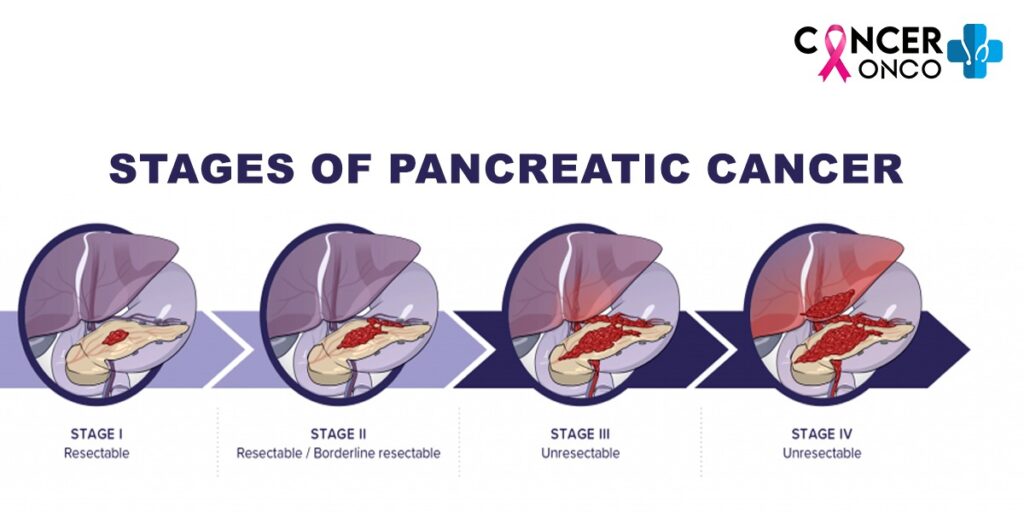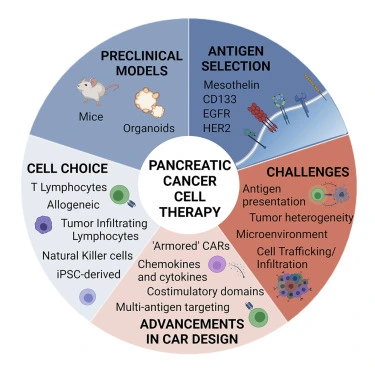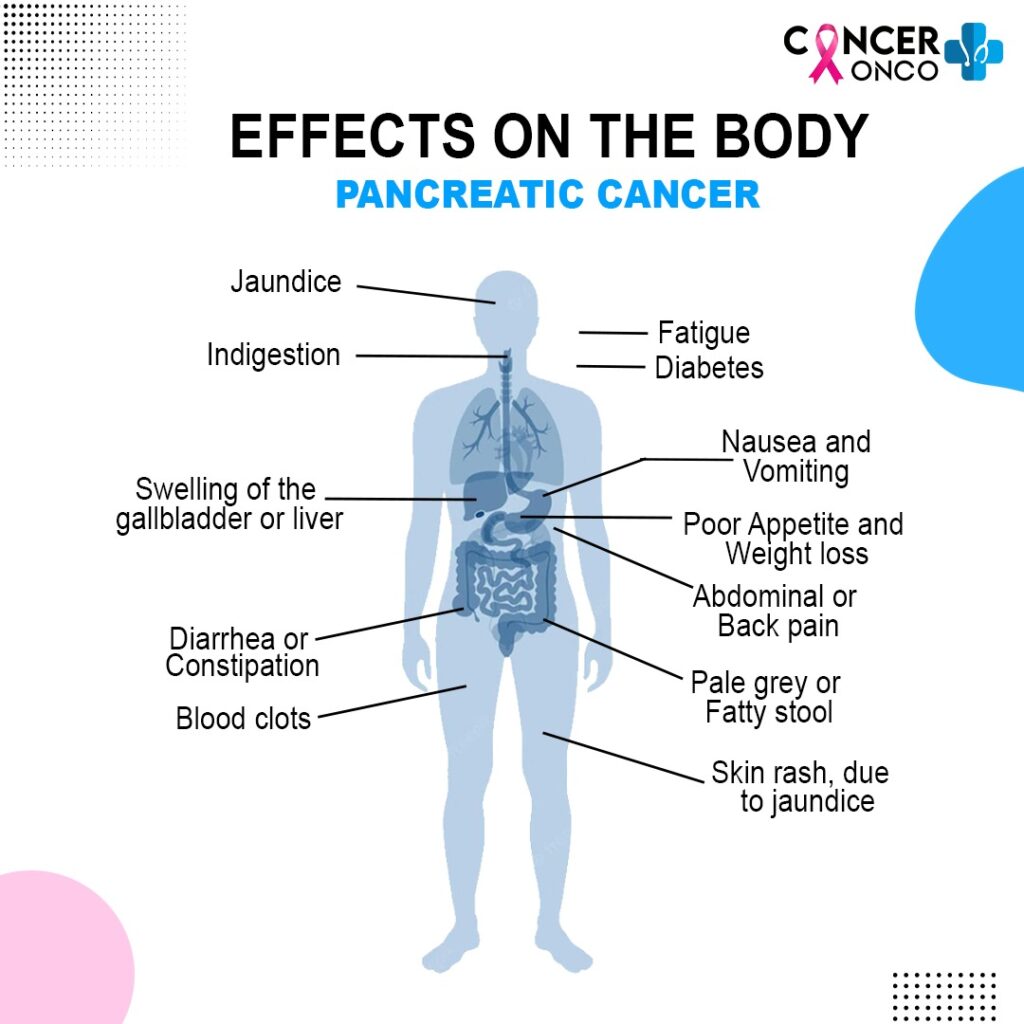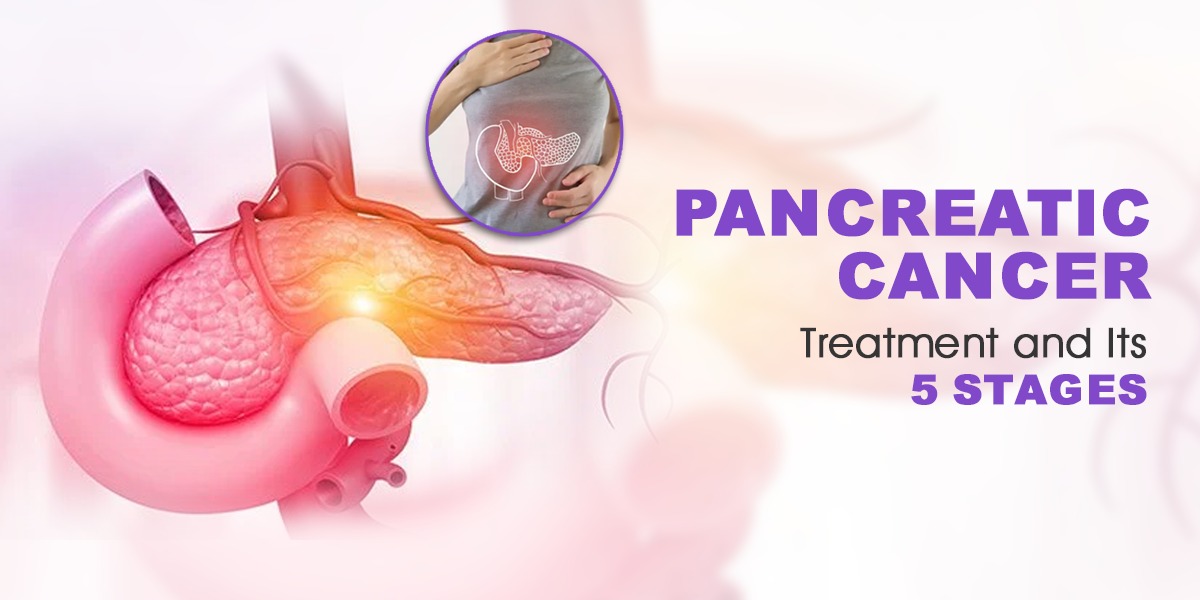Pancreatic cancer is a form of cancer that starts in the pancreas, which is a gland organ. It can grow from any part of the pancreas and can spread to other parts of the body. Pancreatic cancer treatment most often does not cause any symptoms or problems for many years. When it does cause symptoms, they may include pain in the upper back and stomach (often feels like heartburn), feeling full quickly after eating, weight loss for no known reason, difficulty breathing and/or swallowing, dark urine and/or pale stools, new-onset diabetes without warning signs, back pain at night that keeps you up, hoarseness or voice changes, sore throat that lasts more than two weeks, and jaundice (yellowing of the skin and eyes).
What is the pancreas?

The pancreas is a gland that produces several enzymes that help the body digest food. It also produces the hormone insulin, which helps regulate blood sugar levels. Pancreatic cancer occurs when cells in the pancreas grow out of control and form a tumor.
Pancreatic cancer is a serious disease that is often diagnosed at a late stage when it has already spread to other parts of the body. The pancreas is located deep within the abdomen, so early pancreatic cancers usually do not cause any symptoms. By the time symptoms do develop, the cancer is often very difficult to treat.
There are several risk factors for pancreatic cancer, including smoking, diabetes, and family history. Pancreatic cancer can be difficult to detect and diagnose early, but there are some screening tests that can be done to check for it. These tests are typically only recommended for people who are at high risk for the disease.
There are several Pancreatic cancer treatment options available for pancreatic cancer, depending on the stage of the disease. Surgery is often the first Pancreatic cancer treatment option for early-stage pancreatic cancer. Chemotherapy and radiation therapy may also be used to treat pancreatic cancer. Clinical trials are also an option for some people with pancreatic cancer.
What is Pancreatic Cancer?

Pancreatic cancer is a type of cancer that starts in the pancreas. The pancreas is a gland that sits behind the stomach and helps the body break down food and regulate blood sugar. Pancreatic cancer is one of the most deadly types of cancer because it is hard to detect early and has few symptoms.
There are several risk factors for pancreatic cancer, including smoking, obesity, diabetes, and family history. While there is no sure way to prevent pancreatic cancer, you can lower your risk by quitting smoking, maintaining a healthy weight, and controlling your diabetes.
If you are diagnosed with pancreatic cancer treatment will depend on the stage of your cancer. Early-stage cancers may be treated with surgery to remove the tumor. More advanced cancers may require chemotherapy or radiation therapy. Unfortunately, pancreatic cancer is often not caught until it is too late for effective Pancreatic cancer treatment, which is why preventing Pancreatic cancer is so important.
Different Types of Pancreatic Cancer
There are four main types of pancreatic cancer:
1. Exocrine tumors: These makeup about 95 percent of all pancreatic cancers. The most common type is adenocarcinoma, which starts in the cells that line the ducts of the pancreas. Other exocrine tumors include acinar cell carcinoma, neuroendocrine tumors, and sarcoma.
2. Neuroendocrine tumors: These are much less common, making up about 5 percent of all pancreatic cancers. They tend to grow more slowly and are less likely to spread than exocrine tumors.
3. Germ cell tumors: These rare tumors develop in the cells that produce sperm or eggs. They usually affect young adults and children.
4. Pancreatic stromal tumors: These are rare tumors that develop in the connective tissue of the pancreas.
What are the stages of pancreatic cancer?

Pancreatic cancer is categorized into five different stages. Your diagnosis depends on the size and location of the tumor and whether or not the cancer has spread:
Stage 0: Also known as carcinoma in situ, Stage 0 is characterized by abnormal cells in the lining of the pancreas. The cells could become cancerous and spread to nearby tissue.
Stage I: The cancer is limited to the pancreas and has not spread to other organs. Pancreatic cancer treatment may involve surgery to remove the tumor, as well as chemotherapy and radiation therapy.
Stage II: Cancer has spread to nearby tissues or lymph nodes, but is still confined to the abdomen. Pancreatic cancer treatment typically involves a combination of surgery, chemotherapy, and radiation therapy.
Stage III: Cancer has spread beyond the abdomen and into other organs such as the liver or lungs. Pancreatic cancer treatment typically involves a combination of surgery, chemotherapy, and radiation therapy.
Stage IV: Cancer has spread throughout the body and is considered incurable. Pancreatic cancer treatment focuses on relieving symptoms and improving quality of life.
Be sure to talk with your provider about your situation. Understanding your pancreatic cancer prognosis can help you make an informed decision about your best pancreatic cancer treatment centers.
Treatment options for Pancreatic cancer

Pancreatic cancer is a disease in which malignant (cancerous) cells form in the tissues of the pancreas. The pancreas is a gland about 6 inches long that is shaped like a thin pear lying on its side. The wider end of the pancreas, called the head, lies on the right side of the abdomen and is connected to the duodenum (the first part of the small intestine). The body and tail of the pancreas extend across the abdomen toward the left side.
There are several pancreatic cancer treatment options available, but the most effective option depends on the stage of the disease.
The most common treatment for pancreatic cancer is surgery. The type of surgery depends on the stage of the disease. For early-stage disease, surgery may be curative. For more advanced stages, surgery may be used to relieve symptoms or to prepare for other treatments.
Radiation therapy uses high-energy beams to kill cancer cells. It can be given before or after surgery, and it may be used in combination with chemotherapy. Chemotherapy uses drugs to kill cancer cells. It is often given as a pill or intravenously (through a vein).
Targeted therapy is a newer type of treatment that uses drugs to target specific mutations that are found in some pancreatic cancers. This type of therapy is often used in combination with other treatments.
Palliative care focuses on relieving symptoms and improving quality of life for people with terminal illness. It can be provided along with other treatments or at any stage of the disease.
hospice care is a type of palliative care that is provided for people who are expected to live for six months or less. Hospice care focuses on comfort and quality of life, rather than cure.
Clinical trials are research studies that test new treatments. People with pancreatic cancer may be eligible to participate in clinical trials.
What are the risk factors for pancreatic cancer?

Pancreatic cancer is one of the most aggressive and deadly types of cancer. The pancreas is a small organ located behind the stomach that produces enzymes that help with digestion, as well as hormones that regulate blood sugar levels. Pancreatic cancer can develop in any part of the pancreas, but most often starts in the cells that line the ducts.
There are several risk factors for pancreatic cancer, including:
1 Age: The majority of pancreatic cancer cases are diagnosed in people over the age of 65.
2 Smoking: Smoking is by far the most significant risk factor for pancreatic cancer. Those who smoke are two to three times more likely to develop pancreatic cancer than those who don’t smoke.
3 Family history: Having a first-degree relative (parent, sibling or child) with pancreatic cancer roughly doubles your risk of developing the disease.
4 Diabetes: People with diabetes have an increased risk of pancreatic cancer. It’s thought that this may be due to elevated levels of insulin and other hormones in the body.
5 Obesity: Being overweight or obese has been linked to an increased risk of pancreatic cancer. This may be due to inflammation and changes in insulin resistance associated with obesity.
How can I prevent pancreatic cancer?

Pancreatic cancer is a serious disease that can be difficult to treat. However, there are some things you can do to help prevent Pancreatic cancer. Here are a few tips:
(A) Don’t smoke. Smoking is a major risk factor for pancreatic cancer. If you don’t smoke, don’t start. If you do smoke, quit as soon as possible.
(B) Eat a healthy diet. Eating plenty of fruits, vegetables, and whole grains may help protect against pancreatic cancer.
(C) Maintain a healthy weight. Being overweight or obese increases your risk of pancreatic cancer. Try to maintain a healthy weight through diet and exercise.
(D) Limit your alcohol intake. Drinking too much alcohol can increase your risk of pancreatic cancer. If you drink alcohol, do so in moderation.
Conclusion
- Pancreatic cancer is a serious disease that can be fatal if not caught early and treated properly. However, there are ways to prevent pancreatic cancer, and Pancreatic cancer treatment options are available for those who are diagnosed with the disease. We hope that this article has helped you learn more about pancreatic cancer and how to prevent Pancreatic cancer.



